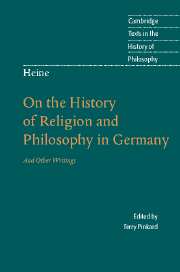Book contents
- Frontmatter
- Contents
- Introduction
- Chronology
- Further reading
- Translator's note
- On the History of Religion and Philosophy in Germany
- Other writings
- From a letter to Moses Moser in Berlin, May 23, 1823
- From The Songbook (1827), “Return home”
- From The Songbook (1827), “North sea: second cycle”
- From Lucca, the City (in Travel Pictures, Part IV, 1831)
- From the Introduction to “Kahldorf on the Nobility in Letters to Count M. von Moltke” (1831)
- From The Romantic School (1835)
- From New Poems (1844), “Poems of the Times,” “Doctrine”
- From the Letters about Germany (1844)
- From the “Afterword” to Romanzero (1851)
- From Confessions (1854)
- Index
- Cambridge Texts in the History of Philosophy
From The Songbook (1827), “Return home”
Published online by Cambridge University Press: 05 June 2012
- Frontmatter
- Contents
- Introduction
- Chronology
- Further reading
- Translator's note
- On the History of Religion and Philosophy in Germany
- Other writings
- From a letter to Moses Moser in Berlin, May 23, 1823
- From The Songbook (1827), “Return home”
- From The Songbook (1827), “North sea: second cycle”
- From Lucca, the City (in Travel Pictures, Part IV, 1831)
- From the Introduction to “Kahldorf on the Nobility in Letters to Count M. von Moltke” (1831)
- From The Romantic School (1835)
- From New Poems (1844), “Poems of the Times,” “Doctrine”
- From the Letters about Germany (1844)
- From the “Afterword” to Romanzero (1851)
- From Confessions (1854)
- Index
- Cambridge Texts in the History of Philosophy
Summary
No. 35
I called the devil and he came,
And I looked at him with amazement.
He is not ugly and not lame,
He is a dear, charming man.
A man in his best years,
Friendly and polite and experienced.
He is a clever diplomat,
And speaks well about church and state,
A little pale, but that's no wonder,
He is currently studying Sanskrit and Hegel.
His favorite poet is still Fouqué.
But now he is done being a critic,
He has fully turned it over
To his dear grandmother, Hecate.
He praised my juristical strivings,
Once himself spent time on it.
He said nothing was dearer to him
Than my friendship, and nodded.
And asked: have we not met already
At the Spanish ambassador's?
And when I looked at him closely,
I recognized an old friend.
No. 58
Too fragmentary are world and life!
For the German Professor I am rife.
He skillfully joins all of life's shreds
In a system through rational deduction;
With his nightcap and his sleeping robe's threads,
He stuffs gaps in the world's construction.
- Type
- Chapter
- Information
- Heine: 'On the History of Religion and Philosophy in Germany' , pp. 122 - 123Publisher: Cambridge University PressPrint publication year: 2007

